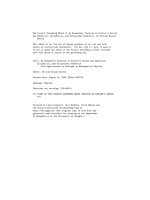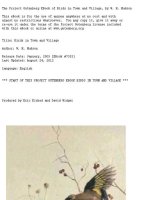The Project Gutenberg EBook of Evolution in Modern Thought, by Ernst Haeckel and J. Arthur Thomson ppt
Bạn đang xem bản rút gọn của tài liệu. Xem và tải ngay bản đầy đủ của tài liệu tại đây (1.91 MB, 876 trang )
The Project Gutenberg EBook of Evolution
in Modern Thought, by
Ernst Haeckel and J. Arthur Thomson and
August Weismann
This eBook is for the use of anyone
anywhere at no cost and with
almost no restrictions whatsoever. You may
copy it, give it away or
re-use it under the terms of the Project
Gutenberg License included
with this eBook or online at
www.gutenberg.org
Title: Evolution in Modern Thought
Author: Ernst Haeckel
J. Arthur Thomson
August Weismann
Release Date: August 29, 2007 [EBook
#22430]
Language: English
*** START OF THIS PROJECT GUTENBERG EBOOK
EVOLUTION IN MODERN THOUGHT ***
Produced by Marilynda Fraser-Cunliffe,
Sankar Viswanathan,
and the Online Distributed Proofreading
Team at
EVOLUTION IN
MODERN
THOUGHT
BY HAECKEL,
THOMSON,
WEISMANN
AND OTHERS
THE MODERN LIBRARY
PUBLISHERS :: :: NEW YORK
CONTENTS
PAGE
I
Darwin's
Predecessors 1
J. Arthur
Thomson,
Professor of
Natural History
in the University
of Aberdeen
II
The Selection
Theory 23
August
Weismann,
Professor of
Zoology in the
University of
Freiburg
(Baden)
III
Heredity and
Variation in
Modern Lights 87
W. Bateson,
Professor of
Biology in the
University of
Cambridge
IV
"The Descent of
Man" 111
G. Schwalbe,
Professor of
Anatomy in the
University of
Strassburg
V
Charles Darwin
as an
Anthropologist 146
Ernst Haeckel,
Professor of
Zoology in the
University of
Jena
VI
Mental Factors
in Evolution 166
C. Lloyd
Morgan,
Professor of
Psychology at
University
College, Bristol
VII The Influence of
the Conception
of Evolution on
Modern
Philosophy
197
H. Höffding,
Professor of
Philosophy in
the University of
Copenhagen
VIII
The Influence of
Darwin Upon
Religious
Thought 223
Rev. P. H.
Waggett
IX
Darwinism and
History 246
J. B. Bury,
Regious
Professor of
Modern History
in the University
of Cambridge
X
Darwinism and
Sociology 264
C. Bouglé,
Professor of
Social
Philosophy in
the University of
Toulouse, and
Deputy-
Professor at the
Sorbonne, Paris
EVOLUTION IN
MODERN THOUGHT
I
DARWIN'S
PREDECESSORS
By J. Arthur Thomson
Professor of Natural History in the
University of Aberdeen
In seeking to discover Darwin's relation to
his predecessors it is useful to distinguish
the various services which he rendered to
the theory of organic evolution.
(I) As everyone knows, the general idea of
the Doctrine of Descent is that the plants
and animals of the present day are the
lineal descendants of ancestors on the
whole somewhat simpler, that these again
are descended from yet simpler forms, and
so on backwards towards the literal
"Protozoa" and "Protophyta" about which
we unfortunately know nothing. Now no
one supposes that Darwin originated this
idea, which in rudiment at least is as old
as Aristotle. What Darwin did was to
make it current intellectual coin. He gave
it a form that commended itself to the
scientific and public intelligence of the
day, and he won widespread conviction
by showing with consummate skill that it
was an effective formula to work with, a
key which no lock refused. In a scholarly,
critical, and pre-eminently fair-minded
way, admitting difficulties and removing
them, foreseeing objections and
forestalling them, he showed that the
doctrine of descent supplied a modal
interpretation of how our present-day
fauna and flora have come to be.
(II) In the second place, Darwin applied
the evolution-idea to particular problems,
such as the descent of man, and showed
what a powerful organon it is, introducing
order into masses of uncorrelated facts,
interpreting enigmas both of structure and
function, both bodily and mental, and, best
of all, stimulating and guiding further
investigation. But here again it cannot be
claimed that Darwin was original. The
problem of the descent or ascent of man,
and other particular cases of evolution,
had attracted not a few naturalists before
Darwin's day, though no one [except
Herbert Spencer in the psychological
domain (1855)] had come near him in
precision and thoroughness of inquiry.
(III) In the third place, Darwin contributed
largely to a knowledge of the factors in the
evolution-process, especially by his
analysis of what occurs in the case of
domestic animals and cultivated plants,
and by his elaboration of the theory of
Natural Selection which Alfred Russel
Wallace independently stated at the same
time, and of which there had been a few
previous suggestions of a more or less
vague description. It was here that
Darwin's originality was greatest, for he
revealed to naturalists the many different
forms—often very subtle—which natural
selection takes, and with the insight of a
disciplined scientific imagination he
realised what a mighty engine of progress
it has been and is.
(IV) As an epoch-marking contribution,
not only to Ætiology but to Natural
History in the widest sense, we rank the
picture which Darwin gave to the world
of the web of life, that is to say, of the
inter-relations and linkages in Nature. For
the Biology of the individual—if that be
not a contradiction in terms—no idea is
more fundamental than that of the
correlation of organs, but Darwin's most
characteristic contribution was not less
fundamental,—it was the idea of the
correlation of organisms. This, again, was
not novel; we find it in the works of
naturalists like Christian Conrad Sprengel,
Gilbert White, and Alexander von
Humboldt, but the realisation of its full
import was distinctly Darwinian.
As Regards the General Idea of Organic
Evolution
While it is true, as Prof. H. F. Osborn puts
it, that "'Before and after Darwin' will
always be the ante et post urbem
conditam of biological history," it is also
true that the general idea of organic
evolution is very ancient. In his admirable
sketch From the Greeks to Darwin,[1]
Prof. Osborn has shown that several of the
ancient philosophers looked upon Nature
as a gradual development and as still in
process of change. In the suggestions of
Empedocles, to take the best instance,
there were "four sparks of truth,—first,
that the development of life was a gradual
process; second, that plants were evolved
before animals; third, that imperfect forms
were gradually replaced (not succeeded)
by perfect forms; fourth, that the natural
cause of the production of perfect forms
was the extinction of the imperfect."[2] But
the fundamental idea of one stage giving
origin to another was absent. As the blue
Ægean teemed with treasures of beauty
and threw many upon its shores, so did
Nature produce like a fertile artist what
had to be rejected as well as what was
able to survive, but the idea of one
species emerging out of another was not
yet conceived.
Aristotle's views of Nature[3] seem to
have been more definitely evolutionist
than those of his predecessors, in this
sense, at least, that he recognised not only
an ascending scale, but a genetic series
from polyp to man and an age-long
movement towards perfection. "It is due to
the resistance of matter to form that Nature
can only rise by degrees from lower to
higher types." "Nature produces those
things which, being continually moved by
a certain principle contained in
themselves, arrive at a certain end."
To discern the outcrop of evolution-
doctrine in the long interval between
Aristotle and Bacon seems to be very
difficult, and some of the instances that
have been cited strike one as forced.
Epicurus and Lucretius, often called poets
of evolution, both pictured animals as
arising directly out of the earth, very much
as Milton's lion long afterwards pawed its
way out. Even when we come to Bruno
who wrote that "to the sound of the harp of
the Universal Apollo (the World Spirit),
the lower organisms are called by stages
to higher, and the lower stages are
connected by intermediate forms with the
higher," there is great room, as Prof.
Osborn points out,[4] for difference of
opinion as to how far he was an
evolutionist in our sense of the term.
The awakening of natural science in the
sixteenth century brought the possibility of
a concrete evolution theory nearer, and in
the early seventeenth century we find
evidences of a new spirit—in the
embryology of Harvey and the
classifications of Ray. Besides sober
naturalists there were speculative
dreamers in the sixteenth and seventeenth
centuries who had at least got beyond
static formulae, but, as Professor Osborn
points out,[5] "it is a very striking fact, that
the basis of our modern methods of
studying the Evolution problem was
established not by the early naturalists nor
by the speculative writers, but by the
Philosophers." He refers to Bacon,
Descartes, Leibnitz, Hume, Kant, Lessing,
Herder, and Schelling. "They alone were
upon the main track of modern thought. It
is evident that they were groping in the
dark for a working theory of the Evolution
of life, and it is remarkable that they
clearly perceived from the outset that the
point to which observation should be
directed was not the past but the present
mutability of species, and further, that this
mutability was simply the variation of
individuals on an extended scale."
Bacon seems to have been one of the first
to think definitely about the mutability of
species, and he was far ahead of his age in
his suggestion of what we now call a
Station of Experimental Evolution.
Leibnitz discusses in so many words how
the species of animals may be changed
and how intermediate species may once
have linked those that now seem
discontinuous. "All natural orders of
beings present but a single chain" "All
advances by degrees in Nature, and
nothing by leaps." Similar evolutionist
statements are to be found in the works of









